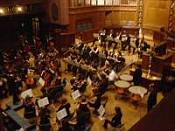 |
TOLFA Segment 17 | Music |
|
All things shall perish from under the sky; Music alone shall live, music alone shall live, Music alone shall live, never to die. |
 Gustav Holst provides a seguay here from our page on Astronomy,
with his suite "The Planets"
- which offers seven themes, one for each known in his day, imagining Mars for example to represent
the "Bringer of War" (we know differently, see Segment 10
Gustav Holst provides a seguay here from our page on Astronomy,
with his suite "The Planets"
- which offers seven themes, one for each known in his day, imagining Mars for example to represent
the "Bringer of War" (we know differently, see Segment 10  ) and Jupiter as the
"Bringer of Jollity." It's not exactly the "Music of the Spheres", except perhaps in that haunting and
extraordinarily beautiful ending to "Neptune", with the ladies' choir fading off into deep space; but
it does form an example of harmless mythology and is one among
thousands of classical works that let us wonder at the marvels of music.
) and Jupiter as the
"Bringer of Jollity." It's not exactly the "Music of the Spheres", except perhaps in that haunting and
extraordinarily beautiful ending to "Neptune", with the ladies' choir fading off into deep space; but
it does form an example of harmless mythology and is one among
thousands of classical works that let us wonder at the marvels of music.
What an amazing thing! Music is universal; every society in the world has some form of music. Most of it can be recognized as such by anyone from any culture; we may not be used to the Indian sitar but we can relate to it, find its playing pleasing. We may not know a word of German, but have no trouble at all getting entranced by Bach, Beethoven, Bruckner or Brahms. Music is the only true international language; it completely bypassed the Tower of Babel. We can enjoy music written long ago, in a style that may seem stilted but it still worth hearing. The quote at the page head is surely true; everything comes to an end - except music. Music lasts, it seems, for ever. Hard to beat that; hard to do other than listen in awe and wonder.
Recall that priceless moment in the movie "The Shawshank Redemption?" - Andy, the wrongly imprisoned hero, finds himself alone in the warden's office opening a care-package of LPs for the prison library. He discovers one of the Mozart opera, "The Marriage of Figaro" and plays it on the phonograph, cranking up the volume on the warden's PA system so that it broadcasts throughout the institution. Every single prisoner, in the yard and in the laundry and in the cellblock, stops what he is doing and listens in wonder.
Morgan Freeman, who acts in the film and narrates the story, is heard to say "Those [soprano] voices soared, higher and farther than anybody in a gray place dares to dream. It was like some beautiful bird flapped into our drab little cage and made those walls dissolve away."
The warden, of course, is furious about the few minutes of undiluted pleasure Andy gave the inmates and puts him straight in solitary.
 Most people are not tone-deaf, and can hum or whistle in tune, more or less, even from an early age.
Extraordinary! The Western tone scale seems "natural" to our ears, long before we ever discover the
exact mathematical relationship among the notes. Any note on one scale ("C", say) has a frequency
precisely twice that of the same C note in the scale below. There are 12 notes per scale, and their
sound frequencies are divided geometrically, not linearly: they increase not by twelfths, but by
multipliers of the twelfth root of 2; thus any note has a frequency greater than the one below
by a factor of 1.0594631. Yet with very little practice, a child singer can reproduce that note, as if
somewhere in the human brain the twelfth root of 2 is hard-wired, right down to
several decimal places! How? - because it "sounds right."
Most people are not tone-deaf, and can hum or whistle in tune, more or less, even from an early age.
Extraordinary! The Western tone scale seems "natural" to our ears, long before we ever discover the
exact mathematical relationship among the notes. Any note on one scale ("C", say) has a frequency
precisely twice that of the same C note in the scale below. There are 12 notes per scale, and their
sound frequencies are divided geometrically, not linearly: they increase not by twelfths, but by
multipliers of the twelfth root of 2; thus any note has a frequency greater than the one below
by a factor of 1.0594631. Yet with very little practice, a child singer can reproduce that note, as if
somewhere in the human brain the twelfth root of 2 is hard-wired, right down to
several decimal places! How? - because it "sounds right."
Some say of this marvel "Amen! It's a gift of God!" but as we saw in Segment 5, that does not fly. One cannot "solve" a mystery in terms of a greater mystery, for that would be no solution; one cannot "explain" something in terms of the unexplainable, for that is no explanation. So such a remark is not just irrational, it's anti-rational; it would violate our human rationality. All we can do - until and unless a rational explanation is one day produced - is to marvel at the mystery and enjoy the music.
As we well know, music comes in may different styles and flavors; classical, elevator, rock, country, rap, etc. And, perhaps we may say, government music.
Government music is the kind played most by government bands. It includes "Hail to the Chief", a melody that would drive any sane person stark, staring mad if played to him several times a day as it is to the President; and of course marches, that stir the soul to patriotic thoughts and motivates otherwise peaceful young men to march off to war and do their best to kill other young men, stirred by similar marches, whom they have never met. It includes anthems, usually set around a warlike theme; "Oh say can you see by the dawn's early light / What so proudly we hailed at the twilight's last gleaming?" - and on to the reminder that the Flag survived "the rocket's red glare, the bombs bursting in air." "Oh, say does that star-spangled banner yet wave / O'er the land of the free and the home of the brave?" - excellent question.
 On the National holiday of July 4th, it curiously includes perfectly good music
imported from Russia: a most popular piece is part of Tchaikovsky's "1812 Overture", written as a memorial
to the dead in the disastrous battle of Borodino. There were 60- to 70,000 of them, killed on a single day. The music plays
well to firecrackers and rockets, but what on Earth has a bloodbath between two imperial powers got
to do with the celebration of the founding of a supposedly free country?
On the National holiday of July 4th, it curiously includes perfectly good music
imported from Russia: a most popular piece is part of Tchaikovsky's "1812 Overture", written as a memorial
to the dead in the disastrous battle of Borodino. There were 60- to 70,000 of them, killed on a single day. The music plays
well to firecrackers and rockets, but what on Earth has a bloodbath between two imperial powers got
to do with the celebration of the founding of a supposedly free country?
 The abilities to play and/or to compose music is by no means universal, though both genetics
and upbringing may have something to do with each. Several classical composers were busy
writing at the age of five or six, and they had both (remember Mozart in the movie "Amadeus?") - but
others had neither. Four extraordinary young men in the English city of Liverpool turned pop music on
its head in the 1960s, just by practicing both those talents when they found they possessed them - and
by dressing alike and wearing what fast became the "Beatles Haircut."
The abilities to play and/or to compose music is by no means universal, though both genetics
and upbringing may have something to do with each. Several classical composers were busy
writing at the age of five or six, and they had both (remember Mozart in the movie "Amadeus?") - but
others had neither. Four extraordinary young men in the English city of Liverpool turned pop music on
its head in the 1960s, just by practicing both those talents when they found they possessed them - and
by dressing alike and wearing what fast became the "Beatles Haircut."
Music: we can't explain it, yet we do enjoy it. One of the great and delightful mysteries of life, at which to freely marvel.






